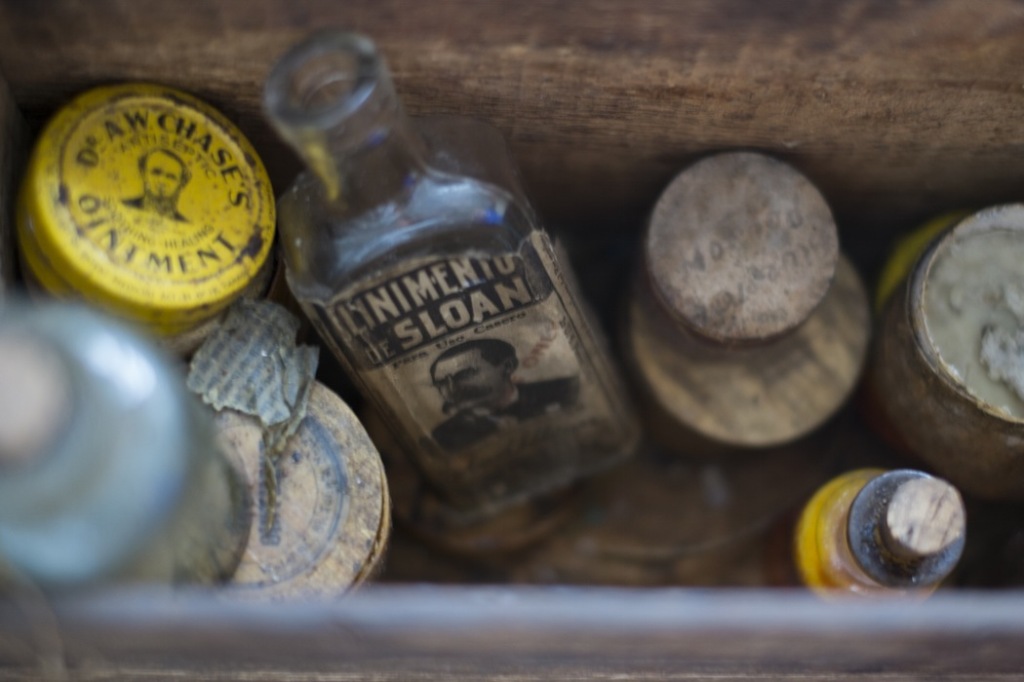There’s an empty apartment. A pair of pink rubber gloves. And 39 garbage bags.
Before throwing the bags to the curb, I will tear each one open and sift through dead plants, pierced cans of floor wax, and half-eroded soaps-on-a-rope. Here on this rickety balcony, amidst the walk-ups and laundry lines, surrounded by the squeals of kids in undershirts playing soccer in the alley, I must salvage:
-Jewellery (poinsettia pins, brooches of reindeers with hats, etc.)
-Family albums, photos, loose & framed
-Deer figurines
-Musical Christmas ornaments (battery-operated, wind-up, etc.)
I have an hour before garbage pick up. I can already hear the trucks rolling through the labyrinth of streets below me. But what I’ve found so far, besides the soap, plants, and floor wax, bears little promise. Maggots squirm in old beige pantyhose as I pick out jars of naphthalene from the 1970s.
This detritus belongs to two elderly French religious sisters next door. Les sœurs lived and worked here in the community. But after 40 years in an apartment with windows overlooking my kitchen, they’ve moved to a home for retired religious sisters. They’d been here long enough to remember a neighbourhood peopled by families with 14 or 15 children. Their final years have been spent encircled by couples. Couples in mediation. Couples who work in different cities and spend only the weekends together. Couples who slip off at dawn clutching sperm samples for delivery to fertility clinics on the other side of town.
Les sœurs lived here when Au lutin qui bouffe was still up on Saint-Grégoire street, with its mascot piglet that patrons could feed with a baby bottle at their table while eating Lobster Carmélite with braised celery. Au lutin qui bouffe burnt down the year that I was born, and I doubt les sœurs ever had their pictures taken with the piglet before it closed for good. The nuns had, of course, taken a vow of poverty, which by default denied them entry into Montreal’s fancier bistros.

by Jenelle Ball
Les sœurs hauled off so few things from their apartment that the men in the moving truck lingered outside for only an hour. Then they were gone.
And now, a week later, they keep phoning me from the reception desk at their new residence, pleading that they’ve lost things in the move. The person who helped them pack (sent by their religious order, a family friend, paid or unpaid—I’ve never been able to ascertain), has thrown out many of their possessions. They’re in the garbage bags, les sœurs say. I don’t know if this is true or if mental confusion after bouts of poor health have led them to believe it.
The bags are thrown willy-nilly onto the balcony. They’re too heavy for me to lift, let alone for a pair of octogenarians who were supposed to throw them to the corner, days ago. But tonight, the issue of ageing and its abasements, of how the elderly are left to fend for themselves, is secondary to the search for an heirloom pie plate and acorn-shaped candleholders.
For the past decade, les sœurs waved to me from their balcony, bounding down the spiral staircase on their way to mass. We’d exchange quick, embarrassed nods of recognition that intimate scenes from domestic life—me jabbering away to myself about petty, workday dramas while cutting vegetables, or my fists banging the window, screeching from the pain of contractions after going into premature labour—have played out in full view of each other’s kitchens. I’d watch les sœurs drive their elderly friends, many younger than they are, to hospital appointments, Bingo, méchouis and parish soirées. They could shovel snow from three flights of stairs.
Their physical decline: I’ve watched it in real-time. Their postures were once formidable, upright bodies housing upright souls. But for the past year, they’ve plodded along to the parish like tired disciples, every stitch of their lives held together by prayer, fraying around the edges from too many winters. I’d watch the nuns reach the corner of our street, heads tilted downward and their hands gripping their prayer books so tightly that their knuckles would turn white.
Humps have appeared just below their napes, growing larger after heart attacks, osteoporosis, and falls on the ice.
*
I gag from the odour of rot and fermentation. I signal to my husband who watches from our kitchen window across the courtyard. Bring me a mask, I scream, burying my nose in the fold of my arm.
Then–in bag number 11. A deer figurine appears. Underneath that, a mid-century skirt marker with a red velvet base. Bag 13: boxes filled with Christmas brooches that blink, buried under coffee grounds and wilted geraniums. There are notes from the New Testament in Biblical Greek wrapped in twine. Bag 17: A glass sphere, miraculous in its unbroken state, filled with crystal angels that sing Silent Night at the top of their little glass lungs with the help of Triple-As. Bag 18: photos, framed and in boxes. Family albums. Letters from nieces away at university. Bag 19: pyrex dishes and cutlery, packets of letters organized by date and circled by rubber bands. A handmade quilt and pattern they’ve written out in cursive script on small squares of paper. Bag 20, 21, 22: Hand-crocheted doilies and thank-you cards from parishoners for years of driving them to chemo and dialysis.
Handmade wooden boxes filled with books and porcelain birds and dogs. Who has done this–stealing everything by throwing it away?
I call their residence, which is named for a saint born in the countryside near here. The saint died young and without any explanation, but prayers in her name have invoked miracles that include the sudden redirection of a forest fire away from a village and the resuscitation of a man crushed by a truck. Mes sœurs! I yell into the phone, wanting to share news of events that can hardly be considered supernatural. J’ai trouvé vos petits trésors! I’ve found your little treasures! Venez me voir, mes sœurs!
The next day they watch as I lay everything out, washed and disinfected, on my dining room table. They shake their heads. There’s no space for it all in their new residential units of uniform size and colour, complete with hospital beds and peach-pastel sheets. One nun is more confused than the last time we met. Mon portrait, she says, her bifocals clouding over, staring down at a photo of her younger self in a blue habit.
Before they leave my house, I make them promises. I will break some of them. I will keep others, a decision based on practicality but also as a result of my own free will. I will not say au revoir on their behalf to fellow neighbours who never noticed their presence, and who will certainly not register their absence. I will not give their bird-shaped salt-and-pepper shakers to the church across the street. I will give them to a friend who loves birds and will use them. That way I’ll have a chance to see them again. And I will not keep all the Christmas ornaments they have given me as an expression of their gratitude. Some are broken. I don’t want to remember les sœurs this way.
I will give many practical items (Pyrex casserole dishes, new measuring cups and 10 unopened packets of aluminum foil) to a soup kitchen. I’ll take photos of the smiling staff who accept them, agreeing to have their pictures taken for the two old ladies whom they’ll never meet. I will send les sœurs these photos and keep some for myself, for motivations unbeknownst to me. Later I’ll understand that these pictures, Cassandra-like in their utility, serve as a warning about what my neighbours might not do for me when I’m no longer capable of doing them for myself.
There are other items, orphaned objects deemed less useful (a souvenir teabag holder from Banff, the skirt marker, the notes in ancient Greek), but valuable enough to withold from the trash. They’re still here, a makeshift shrine perched on a shelf near my window, waiting in the unlikely event that les sœurs will someday return.
 Deborah Ostrovsky lives in Montreal where she has written for Geist, Tablet, Lilith, Herizons and Maisonneuve. She has participated in the Literary Journalism Program at the Banff Centre for the Arts in Alberta. Her essays and fiction can be found in Cabin Fever: The Best New Canadian Non-Fiction and Short Stuff: New English Stories from Quebec.
Deborah Ostrovsky lives in Montreal where she has written for Geist, Tablet, Lilith, Herizons and Maisonneuve. She has participated in the Literary Journalism Program at the Banff Centre for the Arts in Alberta. Her essays and fiction can be found in Cabin Fever: The Best New Canadian Non-Fiction and Short Stuff: New English Stories from Quebec.